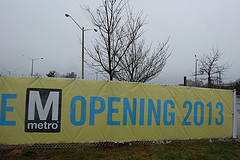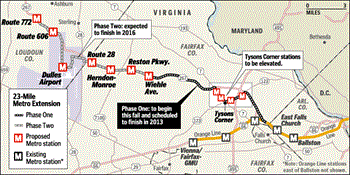
Photo courtesy of Flickr user fairfaxcounty
Rendering of the future Metro stations in Tysons Corner
Value Capture Case Studies is an ongoing series highlighting ways in which cities and regions across the country are using value capture mechanisms to fund transportation plans. These case studies present novel learnings for the Chicago region as it grapples with how to pay for necessary transportation improvements. Each post will focus on real-life examples of value capture mechanisms at work.
To learn more about the basics of value capture read “Value capture case studies: What is value capture?”
Value capture mechanisms referenced in this post:

Photo courtesy of flickr user fairfaxcounty
One of the nation’s largest transit projects to use value capture financing is the Dulles Metrorail expansion in the Washington, D.C., region. The Dulles Corridor in northern Virginia west of the nation's capital is home to Dulles International Airport and Tysons Corner, a massive retail shopping and employment center. Projections show that over the next 25 years, the population in the corridor will grow by 45 percent and employment by 63 percent. The increases in travel demand that correspond with this kind of growth will strain the already overburdened traffic system, resulting in more gridlock and environmental degradation, and threatening local economic opportunities and livability.
As part of the solution to maintain the corridor’s quality of life and regional competitiveness, the Washington Metropolitan Area Transit Authority (WMATA) is constructing a 23-mile extension of the existing Metrorail system to Dulles Airport and to Tysons Corner, Reston and Herndon (Tysons Corner alone draws 120,000 workers each day). The extension is estimated to cost $5.2 billion and will be built in two phases.
Unlike the Chicago region, where sales taxes are a major revenue generator for transit, WMATA has no permanent funding source and relies on federal, state and local appropriations and fare box revenues. Consequently, funding a major rail extension requires “outof- the-box” thinking. Two mechanisms used to fund the Dulles Metrorail extension are the special assessment value capture tool and sharing Dulles Toll Road revenues, including a toll rate increase.
A special assessment is an additional tax or assessment on the full value of a property, usually paid by property owners within a defined Special Assessment District that benefit from a specific public improvement. Because the rail expansion will benefit businesses in the corridor and their customers, commercial landowners petitioned to establish a special assessment district to fund the local share of Phase 1 and 2 construction.
Chapter 15 of the Code of Virginia allows commercial and industrial property owners to petition the Virginia Board of Supervisors to be taxed to raise funds for transportation improvements in their area. At least 51 percent of property owners, measured by land area or assessed value, must approve the taxing district. On Jan. 21, 2004, more than 64 percent of commercial and industrial property owners around Tysons Corner, measured by assessed value, petitioned to create the Phase 1 Dulles Rail Transportation Improvement District. All funds will go toward the Metrorail extension.
Following a public hearing, the Phase 1 District was established on Feb. 23, 2004. Commercial and industrial (not residential) real estate owners in the Phase 1 assessment zone around Tysons Corner will be charged an additional 22 cents per $100 of assessed value (in addition to normal property taxes). There is a $400 million cap on the amount that can be raised through the Phase 1 special assessment.
A similar petition by commercial and industrial property owners in the Reston and Herndon areas was approved in December 2009 creating the Phase 2 Dulles Rail Transportation Improvement District. Phase 2, which will build the line through Reston, Herndon, and Dulles Airport, will be funded in part with a special assessment of five cents per $100 of assessed value in the Phase 2 zone in 2010, rising to 20 cents per $100 of assessed value in 2013. The Phase 2 special assessment is capped at $330 million.
Importantly, these funds generated by the special assessment districts in Phase 1 and 2 will cover the local match needed to leverage federal dollars and service debt.
The Metropolitan Washington Airports Authority (MWAA) is managing the Dulles Metrorail extension. MWAA is partnering with Dulles Transit Partners, a private sector entity formed by Bechtel Infrastructure and Washington Group International (now URS) to complete design and construction of Phase 1. Upon completion of each phase, MWAA will transfer ownership of the rail line to WMATA.
Toll revenues also will fund rail extension
In 2009, the Virginia Dept. of Transportation transferred ownership of the Dulles Toll Road (DTR) to MWAA on the condition that toll road revenues fund the construction of the rail extension. Policy mandates that any available revenues from the toll road must be used to finance transportation improvements within the Dulles Corridor once debt service and operating expenses are paid.
Automobile toll rates on the DTR had not been increased since 1984. In November 2009, MWAA voted to increase rates by $0.25 in 2010 and then two additional 25-cent increases in 2011 and 2012. One hundred percent of the toll increase will be dedicated to the metro rail expansion. Overall, Dulles Toll Road revenues will fund $2.8 billion or 52 percent of the rail expansion project.

The new line begins at the existing East Falls Church Station. En route to Dulles International Airport, the rail will serve Tysons Corner, Herndon and Reston Virginia, eventually reaching the airport and beyond to two Loudoun County locations. When finished, passengers will be able to travel directly between Loudoun County, Va., and downtown Washington, D.C.,. Phase 1 will extend service 12 miles, adding four stations from the East Falls Church Station, through Tysons Corner and Reston. Scheduled completion of Phase 1 is in 2013 and Phase 2 is slated for completion in 2017. It will extend the line an additional 11 miles and add six stations with a stop at Dulles International.
The Dulles Metrorail extension is a textbook example of combining non-transit agency resources to finance a major transit expansion. Using value capture and other innovative financing, such as sharing toll revenues with transit, a project in the works for decades will be accomplished.